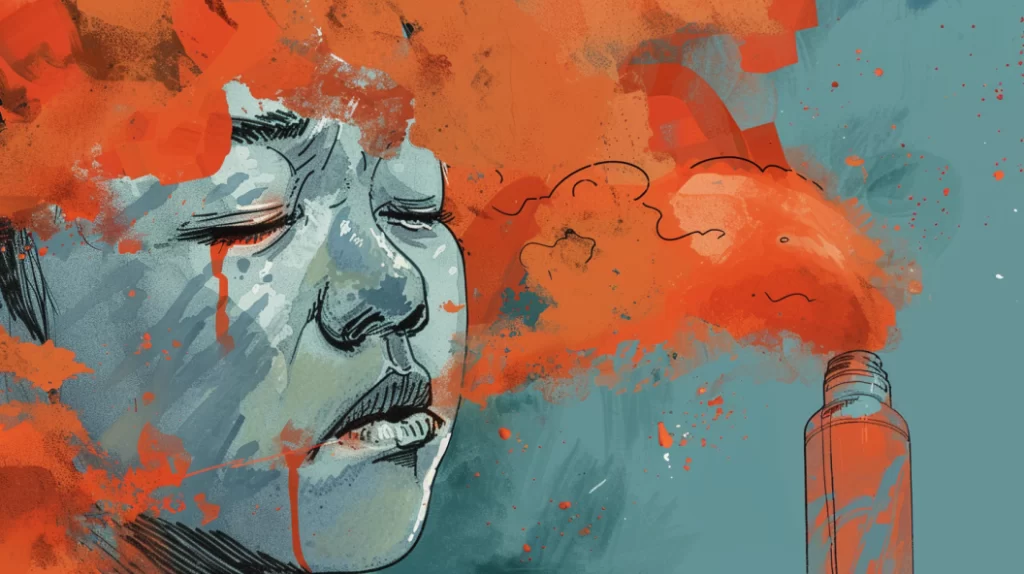No products in the cart.
Main Menu
What Does Pepper Spray Do to You?

Imagine walking down a dark alley when suddenly, you’re hit with the intense burning sensation of pepper spray. This isn’t just any pain; it’s a powerful mix of capsaicin meant to incapacitate you by making your eyes shut tightly, causing extreme difficulty in seeing and triggering a relentless coughing fit. The immediate effects are alarming, but what’s crucial to realize are the potential long-term health risks and the psychological toll it can take. Knowing how to lessen these effects and the importance of seeking medical help is vital. Let’s delve into the lesser-known consequences of this self-defense tool and why proper decontamination is crucial for your well-being.
Key Takeaways
- Causes intense pain, forced eye closure, and temporary blindness upon exposure.
- Induces severe coughing, wheezing, and chest pain due to respiratory distress.
- Can lead to skin irritation and corneal abrasions, affecting vision and skin health.
- Exposure results in psychological effects such as fear, panic, and elevated stress levels.
- Immediate decontamination with water is crucial for mitigating physical and psychological impacts.
Understanding Pepper Spray
Pepper spray contains capsaicin, which can immediately cause your eyes to shut, induce pain, and temporarily blind you upon exposure. This chemical is widely used by law enforcement and can make you feel extremely vulnerable by creating a strong burning sensation on your face and in your eyes. Aside from making you tear up, exposure to this powerful agent can affect your sense of belonging by isolating you in a moment of intense personal discomfort and fear.
Pepper spray doesn’t just affect your face, it also enters your respiratory system, making breathing hard. This feeling of suffocation, combined with impaired vision, can make you feel isolated even in a crowd. Its purpose is to disable and confuse the person it’s used on, highlighting their vulnerabilities.
Understanding the effects of pepper spray is crucial for self-protection and awareness. Knowing how it can affect your body and mind is important whether at a peaceful protest or in a situation with law enforcement. This knowledge promotes community and mutual care, stressing the importance of looking out for each other during difficult times.
Immediate Physical Symptoms
Upon contact with pepper spray, you will experience intense pain, your eyes will involuntarily close, and you will temporarily lose your vision. This is a common reaction that everyone exposed to pepper spray will feel. The effects are overwhelming and can be quite distressing. Pepper spray is a powerful self-defense tool that can incapacitate an attacker by causing these extreme sensations. It is important to be aware of the impact it can have and to use it responsibly. Remember that the temporary discomfort is outweighed by the potential to protect yourself in dangerous situations.
Here’s a quick look at what else you might face:
| Symptom | Description | Duration |
| Coughing | Severe coughing fits, making it hard to breathe | Lasts about 30 minutes |
| Wheezing | Difficulty breathing, accompanied by a wheezy sound | While exposed |
| Chest Pain | Tightness or pain in the chest | Short-term |
| Skin Exposure | Rashes or burns appearing on the skin | Varies on exposure |
| Corneal Abrasions | Scratches on the eyes from forced eye closure | Depends on severity |
Long-Term Health Implications
While rare, the shadow of long-term health consequences can linger for those exposed to high levels of pepper spray. You’re not alone if you’re concerned about what this might mean for you in the long run. Here’s what you need to keep an eye on:
- Corneal Damage: Continuous or high exposure can harm your eyes, leading to lasting vision problems.
- Skin Irritation: Some people might notice that their skin doesn’t return to normal quickly and remains irritated or sensitive for a prolonged period.
- Respiratory Conditions: For those with asthma or other breathing issues, pepper spray can exacerbate your condition, making it more than just a temporary discomfort.
- Severe Complications: Although incredibly rare, complications like arrhythmia have been known to occur, necessitating hospitalization.
If you are experiencing ongoing symptoms or if your condition doesn’t improve, it’s important to seek medical help promptly. It’s crucial to prioritize your health and not ignore any potential complications. Remember, getting professional guidance and closely monitoring your well-being after exposure is key to a full recovery. Don’t hesitate to consult a medical professional for proper evaluation and monitoring. Your well-being is the top priority, so don’t delay in getting the necessary care.
Psychological Effects
Experiencing the intense burn of pepper spray can immediately cause fear, panic, and anxiety. It’s not just the physical pain that hurts, but also the overwhelming psychological impact. Suddenly, you’re dealing with the sting and feeling disoriented and vulnerable. It’s like the ground has shifted, leaving you searching for normalcy and safety.
Feeling vulnerable can quickly lead to helplessness and distress because you realize there’s little you can do to ease the pain right away. This psychological impact goes beyond just feeling uncomfortable; it increases stress levels and emotional distress. You may find yourself stuck in a fight-or-flight response, both physically and emotionally. The trauma from such experiences can linger, becoming a vivid memory that triggers feelings of anxiety and fear long after the physical effects have faded.
Experiencing pepper spray isn’t just a temporary difficulty; it’s a traumatic event that can cause lasting emotional harm, emphasizing the serious psychological impact of such an incident. The effects of being exposed to pepper spray can be long-lasting and can deeply affect a person’s mental well-being. Recognizing the emotional distress resulting from such an encounter is crucial, as it can significantly impact a person’s overall health and quality of life. Understanding the psychological toll of pepper spray exposure is essential in addressing the full scope of its effects on individuals. By acknowledging the emotional scars left behind, we can work towards providing better support and care for those who have gone through such challenging experiences.
Decontamination and Treatment
After getting pepper sprayed, it’s crucial to decontaminate immediately by rinsing the affected areas with water. This is the first step in removing the irritant and reducing your discomfort. Remember, many people have been in your shoes and have also had to go through this essential process. It’s important because it helps to remove the pepper spray and make you feel better. So, don’t hesitate to wash the affected areas with water immediately.
To deepen your understanding, here are four key steps in the decontamination process:
- Flush the affected area with water. This helps to dilute and wash away the irritant.
- Blink rapidly if your eyes are affected. This natural response helps to flush out the pepper spray particles.
- Emergency responders might use saline solutions and wipes. These aids are specially designed to help further clean the area and soothe the irritation.
- Ensure exposure occurs in well-ventilated areas to prevent the spray from affecting others. Also, proper storage of pepper spray should be practiced to avoid accidental exposure.
Frequently Asked Questions
Can Pepper Spray Damage You?
Yes, pepper spray can harm you, causing temporary blindness, breathing difficulties, and a burning sensation on your skin. These effects, though temporary, are intense, especially if it hits your face directly. Always handle it carefully.
How Long Do Pepper Spray Effects Last?
Pepper spray effects typically last between 30 minutes to an hour, but you might experience temporary blindness and throat discomfort for a shorter period. Without proper care, the discomfort can linger longer than expected.
Can You Fight Through Pepper Spray?
Facing pepper spray’s fiery embrace is like weathering a storm of needles on your skin and eyes. You’ll find fighting through it nearly impossible, as it blinds and overwhelms you, leaving you vulnerable.
What Neutralizes Pepper Spray?
To neutralize pepper spray, you can use a sodium bicarbonate solution, milk, a saline solution, or a mix of baby shampoo and water. Applying a cold compress afterward can also help soothe your skin.

